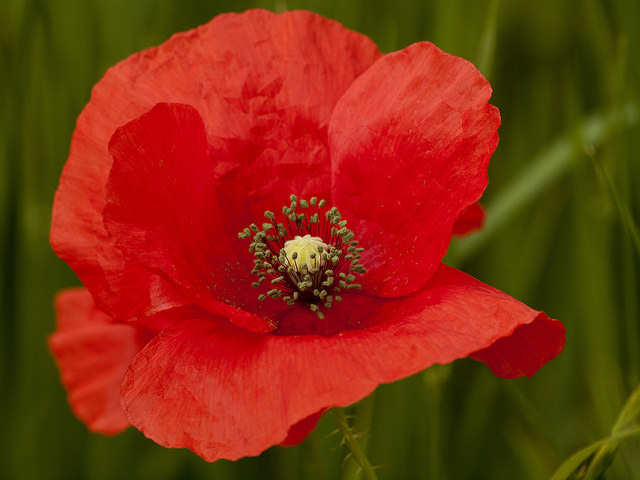Chip in to keep stories like these coming.
A civilization that forgets its poetry is barely worthy of the name.
Like fiction and unlike non-fiction, poetry is how a culture’s most profound truths are told. Unlike fiction, poetry does this vital work with great economy of words.
That is why all great civilizations honour their great poets. Those that forget their poetry — or reduce it to a cheap trinket — are already in decline.
Probably the best-known poem in Canada — perhaps the only well-known poem in Canada nowadays — is In Flanders Fields, written by Dr. John McCrae, a surgeon in the Canadian Expeditionary Force during the Second Battle of Ypres in Belgium in the spring of 1915, to memorialize a friend who died in the fighting. It was first published 100 years ago this Dec. 8. This is the poem that is read by school kids every Nov. 11, Remembrance Day.
The trouble is, to be blunt, it is not really a very good poem. It is excessively sentimental. It is jingoistic. The bloody squalor from which it arose has been sanitized, by the poet and by time and propaganda.
McCrae seems to have recognized immediately there was something wrong with In Flanders Fields. At any rate, legend has it he crumpled it up and tossed it away. But, as history sometimes demands, it was retrieved.
The first five lines are a faint reminder of the situation faced by the Canadians in Flanders in 1915. They had just withstood the mighty hammer of the German Army, including gas attacks that left soldiers drowning in chlorine. This part of Belgium was the crucible where, our national myth has it with some justice, the Canadian nation was forged. But the ineptitude of leadership, and the mechanized industrial-scale slaughter into which the troops were fed has been scrubbed up and polished:
In Flanders fields the poppies blow
Between the crosses, row on row,
That mark our place; and in the sky
The larks, still bravely singing, fly
Scarce heard amid the guns below.
The next four sentimental lines are likely the reason for the poem’s popular success, offering the living a way to remember their dead:
We are the Dead. Short days ago
We lived, felt dawn, saw sunset glow,
Loved and were loved, and now we lie
In Flanders fields.
The last six lines are pure jingo, a recruiting tool to enlist the working class of the British Empire in a war that, on both sides, did not advance their interests a muddy, bloody foot:
Take up our quarrel with the foe:
To you from failing hands we throw
The torch; be yours to hold it high.
If ye break faith with us who die
We shall not sleep, though poppies grow
In Flanders fields.
Do the children who are urged nowadays with such high zest to read this aloud understand the foe with whom we are entreated to fight on is now our esteemed NATO ally? I wonder what the dead from 100 years ago make of this, sleepless as they are said to be?
We Canadians have had other wars since, some of which have been as pointless and incompetently led as the Great War, and which have served the same interests as architects of the Great War set out to serve. It was nearly their undoing, but they are with us still.
In Flanders Fields became a recruiting tool. Its message as the Great War still raged, and its message still, is the old lie: “It is sweet and fitting to die for one’s country,” as Horace put it. Which is to say, too often, it is sweet and fitting to die for the interests of the class that runs one’s country, or so they would like you to imagine.
Maybe now — at the end of the most jingoistic decade in Canadian history since the end of the Second World War, which followed that first one quick enough — would be a worthy time to remember that better poetry sprang up in English from the bloody fields of Flanders.
Siegfried Sassoon? Wilfred Owen?
Perhaps we should try to remedy this some Remembrance Day soon. No harm and some good would come asking Canadian school children to memorize something like the English poet Wilfred Owen’s words below, well known when I was a lad but apparently unwisely mostly forgotten now. It would be a fitting and honourable tribute to the dead in Canada’s wars:
Dulce et Decorum Est
Bent double, like old beggars under sacks,
Knock-kneed, coughing like hags, we cursed through sludge,
Till on the haunting flares we turned our backs,
And towards our distant rest began to trudge.
Men marched asleep. Many had lost their boots,
But limped on, blood-shod. All went lame; all blind;
Drunk with fatigue; deaf even to the hoots
Of gas-shells dropping softly behind.
Gas! GAS! Quick, boys!—An ecstasy of fumbling
Fitting the clumsy helmets just in time,
But someone still was yelling out and stumbling
And flound’ring like a man in fire or lime.—
Dim through the misty panes and thick green light,
As under a green sea, I saw him drowning.
In all my dreams before my helpless sight,
He plunges at me, guttering, choking, drowning.
If in some smothering dreams, you too could pace
Behind the wagon that we flung him in,
And watch the white eyes writhing in his face,
His hanging face, like a devil’s sick of sin;
If you could hear, at every jolt, the blood
Come gargling from the froth-corrupted lungs,
Obscene as cancer, bitter as the cud
Of vile, incurable sores on innocent tongues,—
My friend, you would not tell with such high zest
To children ardent for some desperate glory,
The old Lie: Dulce et decorum est
Pro patria mori.
This post also appears on David Climenhaga’s blog, AlbertaPolitics.ca.
Chip in to keep stories like these coming.



